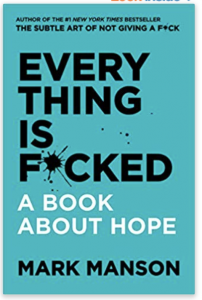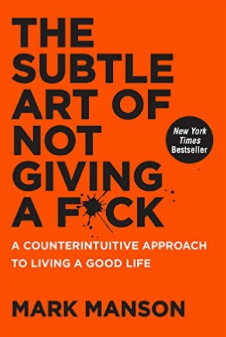I recently read (the kindle version of) “Everything Is F*cked: A Book About Hope” by Mark Manson. Here are the quotes I found most interesting.
 How May I Help You? If I worked at Starbucks, instead of writing people’s names on their coffee cup, I’d write the following: One day, you and everyone you love will die. And beyond a small group of people for an extremely brief period of time, little of what you say or do will ever matter. This is the Uncomfortable Truth of life. And everything you think or do is but an elaborate avoidance of it. We are inconsequential cosmic dust, bumping and milling about on a tiny blue speck. We imagine our own importance. We invent our purpose—we are nothing. Enjoy your fucking coffee. Location 123-126
How May I Help You? If I worked at Starbucks, instead of writing people’s names on their coffee cup, I’d write the following: One day, you and everyone you love will die. And beyond a small group of people for an extremely brief period of time, little of what you say or do will ever matter. This is the Uncomfortable Truth of life. And everything you think or do is but an elaborate avoidance of it. We are inconsequential cosmic dust, bumping and milling about on a tiny blue speck. We imagine our own importance. We invent our purpose—we are nothing. Enjoy your fucking coffee. Location 123-126
The opposite of happiness is hopelessness, an endless gray horizon of resignation and indifference. Location 153-154
Hopelessness is the root of anxiety, mental illness, and depression. It is the source of all misery and the cause of all addiction. This is not an overstatement.4 Chronic anxiety is a crisis of hope. It is the fear of a failed future. Depression is a crisis of hope. It is the belief in a meaningless future. Delusion, addiction, obsession—these are all the mind’s desperate and compulsive attempts at generating hope one neurotic tic or obsessive craving at a time. Location 158-162
Studies done in more than 132 countries show that the wealthier a country becomes, the more its population struggles with feelings of meaning and purpose. Location 326-327
The wealthier and safer the place you live, the more likely you are to commit suicide. Location 249-250
Hope doesn’t care about the problems that have already been solved. Hope cares only about the problems that still need to be solved. Because the better the world gets, the more we have to lose. And the more we have to lose, the less we feel we have to hope for. Location 255-257
To build and maintain hope, we need three things: a sense of control, a belief in the value of something, and a community. Location 257-258
And we usually don’t lie out of malice—rather, we lie to others because we’re in such a habit of lying to ourselves. Location 703-704
Wherever there is pain, there is always an inherent sense of superiority/inferiority. And there’s always pain. Location 727-728
Leaders need their followers to be perpetually dissatisfied; it’s good for the leadership business. If everything were perfect and great, there’d be no reason to follow anybody. Location 1471-1472
Success is in many ways far more precarious than failure. First, because the more you gain the more you have to lose, and second, because the more you have to lose, the harder it is to maintain hope. Location 1514-1515
By experiencing our hopes, we lose them. We see that our beautiful visions for a perfect future are not so perfect, that our dreams and aspirations are themselves riddled with unexpected flaws and unforeseen sacrifices. Location 1515-1517
The only thing that can ever truly destroy a dream is to have it come true. Location 1517-1518
Ideologies, because they’re constantly challenged, changed, proven, and then disproven, offer scant psychological stability upon which to build one’s hope. And when the ideological foundation of our Ideologies, because they’re constantly challenged, changed, proven, and then disproven, offer scant psychological stability upon which to build one’s hope. Location 1690-1691
Thus, began the stupid dick-measuring contest also known as human history. Location 1723-1724
We’ve got it backward: everything being fucked doesn’t require hope; hope requires everything being fucked. Location 1752-1752
Hope is, therefore, destructive. Hope depends on the rejection of what currently is. Location 1755-1756
A friend of mine once described parenthood as “basically just following around a kid for a couple decades and making sure he doesn’t accidentally kill himself—and you’d be amazed how many ways a kid can find to accidentally kill himself.” Location 1890-1892
then they won’t actually trust you. The most precious and important things in life are, by definition, nontransactional. And to try to bargain for them is to immediately destroy them. You cannot conspire for happiness; it is impossible. But this is often what people try to do, especially when they seek out self-help and other personal development advice—they are essentially saying, “Show me the rules of the game I have to play, and I’ll play it,” not realizing that it’s the very fact that they think there are rules to happiness that is preventing them from being happy. Location 1955-1958
Becoming an adult is therefore developing the ability to do what is right for the simple reason that it is right. Location 1965-1966
This is essentially what good early parenting boils down to: implementing the correct consequences for a child’s pleasure/pain-driven behavior. Punish them for stealing ice cream; reward them for sitting quietly in a restaurant. Location 1992-1994
Graduating to adolescence requires trust. A child must trust that her behavior will produce predictable outcomes. Location 2007-2008
the problem with hope is that it is fundamentally transactional—it is a bargain between one’s current actions for some imagined, pleasant future. Don’t eat this, and you’ll go to heaven. Don’t kill that person, or you’ll get in trouble. Work hard and save your money, because that will make you happy. Location 2122-2124
The Blue Dot Effect suggests that, essentially, the more we look for threats, the more we will see them, regardless of how safe or comfortable our environment actually is. Location 2251-2252
Developmental psychology has long argued something similar: that protecting people from problems or adversity doesn’t make them happier or more secure; it makes them more easily insecure. Location 2268-2269
What we find, then, is that our emotional reactions to our problems are not determined by the size of the problem. Rather, our minds simply amplify (or minimize) our problems to fit the degree of stress we expect to experience. Location 2271-2273
Nobody is fully happy all the time, but similarly, nobody is fully unhappy all the time, either. It seems that humans, Location 2344-2345
Regardless of our external circumstances, live in a constant state of mild-but-not-fully-satisfying happiness. Put another way, things are pretty much always fine, but they could also always be better. Location 2345-2346
Human perception and expectations warp themselves to fit a predetermined amount of pain. Location 2361-2362
Because you can’t get rid of pain—pain is the universal constant of the human condition. Therefore, the attempt to move away from pain, to protect oneself from all harm, can only backfire. Trying to eliminate pain only increases your sensitivity to suffering, rather than alleviating your suffering. It causes you to see dangerous ghosts in every nook, to see tyranny and oppression in every authority, to see hate and deceit behind every embrace. Location 2390-2393
Not only is there no escaping the experience of pain, but pain is the experience. Location 2407-2408
Living well does not mean avoiding suffering; it means suffering for the right reasons. Location 2416-2416
Our tolerance for pain, as a culture, is diminishing rapidly. And not only is this diminishment failing to bring us more happiness, but it’s generating greater amounts of emotional fragility, which is why everything appears to be so fucked. Location 2531-2533
Meditation is, at its core, a practice of antifragility: training your mind to observe and sustain the never-ending ebb and flow of pain and not to let the “self” get sucked away by its riptide.
Location 2544-2546
The pursuit of happiness is, then, an avoidance of growth, an avoidance of maturity, an avoidance of virtue. It is treating ourselves and our minds as a means to some emotionally giddy end. It is sacrificing our consciousness for feeling good. It’s giving up our dignity for more comfort. Location 2611-2613
No matter how much wealth is generated in the world, the quality of our lives is determined by the quality of our character, and the quality of our character is determined by our relationship to our pain. Location 2625-2627
He saw marketing as an incredible new tool that could give people the feeling of having freedom when, really, you’re just giving them a few more flavors of toothpaste to choose from. Location 2813-2815
More stuff doesn’t make us freer, it imprisons us with anxiety over whether we chose or did the best thing. Location 2837-2837
The only true form of freedom, the only ethical form of freedom, is through self-limitation. It is not the privilege of choosing everything you want in your life, but rather, choosing what you will give up in your life. Location 2843-2845
Even if all the problems of today get magically fixed, our minds will still perceive the inevitable fuckedness of tomorrow. Location 3165-3165
Don’t hope for better. Just be better. Location 3169-3169
“The trick is you bite off more than you can chew . . . and then you chew it.” Location 3239-3240


